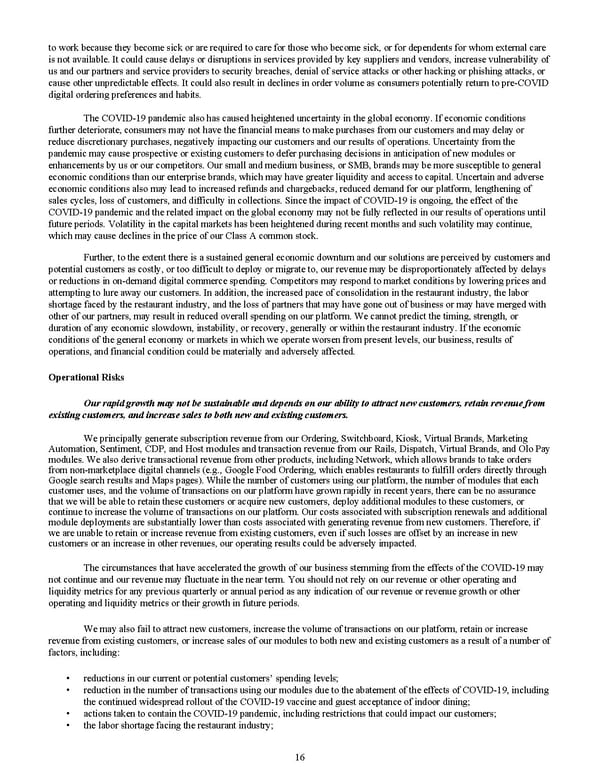to work because they become sick or are required to care for those who become sick, or for dependents for whom external care is not available. It could cause delays or disruptions in services provided by key suppliers and vendors, increase vulnerability of us and our partners and service providers to security breaches, denial of service attacks or other hacking or phishing attacks, or cause other unpredictable effects. It could also result in declines in order volume as consumers potentially return to pre-COVID digital ordering preferences and habits. The COVID-19 pandemic also has caused heightened uncertainty in the global economy. If economic conditions further deteriorate, consumers may not have the financial means to make purchases from our customers and may delay or reduce discretionary purchases, negatively impacting our customers and our results of operations. Uncertainty from the pandemic may cause prospective or existing customers to defer purchasing decisions in anticipation of new modules or enhancements by us or our competitors. Our small and medium business, or SMB, brands may be more susceptible to general economic conditions than our enterprise brands, which may have greater liquidity and access to capital. Uncertain and adverse economic conditions also may lead to increased refunds and chargebacks, reduced demand for our platform, lengthening of sales cycles, loss of customers, and difficulty in collections. Since the impact of COVID-19 is ongoing, the effect of the COVID-19 pandemic and the related impact on the global economy may not be fully reflected in our results of operations until future periods. Volatility in the capital markets has been heightened during recent months and such volatility may continue, which may cause declines in the price of our Class A common stock. Further, to the extent there is a sustained general economic downturn and our solutions are perceived by customers and potential customers as costly, or too difficult to deploy or migrate to, our revenue may be disproportionately affected by delays or reductions in on-demand digital commerce spending. Competitors may respond to market conditions by lowering prices and attempting to lure away our customers. In addition, the increased pace of consolidation in the restaurant industry, the labor shortage faced by the restaurant industry, and the loss of partners that may have gone out of business or may have merged with other of our partners, may result in reduced overall spending on our platform. We cannot predict the timing, strength, or duration of any economic slowdown, instability, or recovery, generally or within the restaurant industry. If the economic conditions of the general economy or markets in which we operate worsen from present levels, our business, results of operations, and financial condition could be materially and adversely affected. Operational Risks Our rapid growth may not be sustainable and depends on our ability to attract new customers, retain revenue from existing customers, and increase sales to both new and existing customers. We principally generate subscription revenue from our Ordering, Switchboard, Kiosk, Virtual Brands, Marketing Automation, Sentiment, CDP, and Host modules and transaction revenue from our Rails, Dispatch, Virtual Brands, and Olo Pay modules. We also derive transactional revenue from other products, including Network, which allows brands to take orders from non-marketplace digital channels (e.g., Google Food Ordering, which enables restaurants to fulfill orders directly through Google search results and Maps pages). While the number of customers using our platform, the number of modules that each customer uses, and the volume of transactions on our platform have grown rapidly in recent years, there can be no assurance that we will be able to retain these customers or acquire new customers , deploy additional modules to these customers, or continue to increase the volume of transactions on our platform . Our costs associated with subscription renewals and additional module deployments are substantially lower than costs associated with generating revenue from new customers. Therefore, if we are unable to retain or increase revenue from existing customers, even if such losses are offset by an increase in new customers or an increase in other revenues, our operating results could be adversely impacted. The circumstances that have accelerated the growth of our business stemming from the effects of the COVID-19 may not continue and our revenue may fluctuate in the near term. You should not rely on our revenue or other operating and liquidity metrics for any previous quarterly or annual period as any indication of our revenue or revenue growth or other operating and liquidity metrics or their growth in future periods. We may also fail to attract new customers, increase the volume of transactions on our platform, retain or increase revenue from existing customers, or increase sales of our modules to both new and existing customers as a result of a number of factors, including: • reductions in our current or potential customers’ spending levels; • reduction in the number of transactions using our modules due to the abatement of the effects of COVID-19, including the continued widespread rollout of the COVID-19 vaccine and guest acceptance of indoor dining; • actions taken to contain the COVID-19 pandemic, including restrictions that could impact our customers; • the labor shortage facing the restaurant industry; 16
 2022 10K Page 22 Page 24
2022 10K Page 22 Page 24